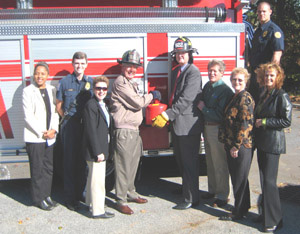Concerns about a languishing energy bill in Congress are motivating Senators to take action that would increase the Renewable Fuels Standard (RFS) even without it.
U.S. Senators Byron Dorgan (D-ND) and Richard Lugar (R-IN) have introduced legislation called the Renewable Fuels Strategy Act of 2007 that contains several provisions including a larger Renewable Fuels Standard of 36 billion gallons of annual renewable fuel use by 2022.
 The 20th annual American Coalition for Ethanol praised the act, according to Executive Vice President Brian Jennings, “A comprehensive approach to the production, distribution, and consumption of ethanol is absolutely crucial to advancing this country’s energy situation from its current state to a more positive, diversified future.”
The 20th annual American Coalition for Ethanol praised the act, according to Executive Vice President Brian Jennings, “A comprehensive approach to the production, distribution, and consumption of ethanol is absolutely crucial to advancing this country’s energy situation from its current state to a more positive, diversified future.”
The bill also calls for increased production of Flexible Fuel Vehicles and expanded renewable fuels infrastructure, including an increase in the tax credit from 30% to 50%. The infrastructure provisions apply to E85 pumps, but also to Blender Pumps, which dispense mid-level ethanol blends between 10% and 85%.
The Renewable Fuels Strategy Act is co-sponsored by Senators Lugar (R-IN), Cantwell (D-WA), Craig (R-ID), Johnson (D-SD), McCaskill (D-MO), and Klobuchar (D-MN).
In addition, Senators Domenici (R-NM), Nelson (D-NE), Grassley (R-IA) and Thune (R-SD), introduced a Renewable Fuels Standard amendment to the 2007 Farm Bill that specifically calls for the production of 21 billion gallons of cellulosic ethanol by the year 2022.


 Massachusetts lawmakers will consider a proposal designed to increase that state’s use of biofuels. State Senate President Therese Murray and House Speaker Sal DiMasi, working with Governor Deval Patrick, filed a bill today that sets usage standards and creates a state Biofuels Task Force, responsible for addressing issues, such as energy crop incentives, tax credits for advanced biofuels research and development, fuel performance standards, and requirements to produce flex-fuel vehicles.
Massachusetts lawmakers will consider a proposal designed to increase that state’s use of biofuels. State Senate President Therese Murray and House Speaker Sal DiMasi, working with Governor Deval Patrick, filed a bill today that sets usage standards and creates a state Biofuels Task Force, responsible for addressing issues, such as energy crop incentives, tax credits for advanced biofuels research and development, fuel performance standards, and requirements to produce flex-fuel vehicles. What started as a project to brew biodiesel in some old pots from the school cafeteria has turned into a 100,000-gallon-a-year production line that saves the school an estimated $125,000 a year in fuel costs.
What started as a project to brew biodiesel in some old pots from the school cafeteria has turned into a 100,000-gallon-a-year production line that saves the school an estimated $125,000 a year in fuel costs. A cellulosic ethanol company funded by California-based Khosla Ventures is holding a groundbreaking this week for its first planned facility in Georgia.
A cellulosic ethanol company funded by California-based Khosla Ventures is holding a groundbreaking this week for its first planned facility in Georgia.
 Jessica Kelly, maker of the documentary “Revolution Green: A True Story of Biodiesel in America,” returned to her alma mater, the University of Colorado, for a screening this past weekend of her movie.
Jessica Kelly, maker of the documentary “Revolution Green: A True Story of Biodiesel in America,” returned to her alma mater, the University of Colorado, for a screening this past weekend of her movie.
 A decade ago, King chose to solve a grease overflow problem at Maui’s landfill. He now has turned that grease waste into biodiesel fuel and built 10 biodiesel plants across the country.
A decade ago, King chose to solve a grease overflow problem at Maui’s landfill. He now has turned that grease waste into biodiesel fuel and built 10 biodiesel plants across the country. Senator John Thune (R-SD) and Senator Charles Grassley (R-IA) led a bi-partisan group of Senators in writing a letter to the President last week urging him to direct the Environmental Protection Agency to approve higher blends of ethanol in commercial gasoline. The current maximum blend for non-flex fuel vehicles is 10% ethanol.
Senator John Thune (R-SD) and Senator Charles Grassley (R-IA) led a bi-partisan group of Senators in writing a letter to the President last week urging him to direct the Environmental Protection Agency to approve higher blends of ethanol in commercial gasoline. The current maximum blend for non-flex fuel vehicles is 10% ethanol. Grassley said, “With consideration of a new farm bill as well as a new energy bill well underway, ethanol and renewable fuels are at the forefront of the discussion. And, while we’ve seen a tremendous jump in knowledge, promotion and usage of renewable fuels, there remain very real barriers. In the absence of widespread E85 use at this time, it’s important to ensure a market for today’s ethanol production.”
Grassley said, “With consideration of a new farm bill as well as a new energy bill well underway, ethanol and renewable fuels are at the forefront of the discussion. And, while we’ve seen a tremendous jump in knowledge, promotion and usage of renewable fuels, there remain very real barriers. In the absence of widespread E85 use at this time, it’s important to ensure a market for today’s ethanol production.”  A plan to build a 75-million-gallon-a-year biodiesel plant has received approval from the Clovis, New Mexico City Commission.
A plan to build a 75-million-gallon-a-year biodiesel plant has received approval from the Clovis, New Mexico City Commission. The agreement is with an Australian company that plans to build a biodiesel plant near the eastern New Mexico community.
The agreement is with an Australian company that plans to build a biodiesel plant near the eastern New Mexico community.